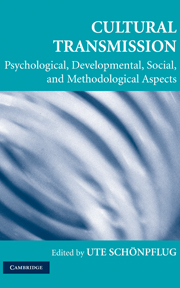Book contents
- Frontmatter
- Contents
- Foreword
- Contributors
- 1 Introduction to Cultural Transmission: Psychological, Developmental, Social, and Methodological Aspects
- 2 Theory and Research in Cultural Transmission: A Short History
- PART ONE EVOLUTIONARY PERSPECTIVE
- PART TWO CROSS-CULTURAL PERSPECTIVE
- 6 An Ecocultural Perspective on Cultural Transmission: The Family across Cultures
- 7 Intergenerational Relations and Cultural Transmission
- 8 Intergenerational Transmission, Social Capital, and Interethnic Contact in Immigrant Families
- 9 Developmental Processes Related to Intergenerational Transmission of Culture: Growing Up with Two Cultures
- 10 The Transmission Process: Mechanisms and Contexts
- 11 Accounting for Parent–Child Value Congruence: Theoretical Considerations and Empirical Evidence
- 12 Culture, Migration, and Family-Value Socialization: A Theoretical Model and Empirical Investigation with Russian-Immigrant Youth in Israel
- 13 Immigrant Parents' Age Expectations for the Development of Their Adolescent Offspring: Transmission Effects and Changes after Immigration
- PART THREE INTRACULTURAL VARIATIONS
- Index
- References
9 - Developmental Processes Related to Intergenerational Transmission of Culture: Growing Up with Two Cultures
Published online by Cambridge University Press: 05 June 2012
- Frontmatter
- Contents
- Foreword
- Contributors
- 1 Introduction to Cultural Transmission: Psychological, Developmental, Social, and Methodological Aspects
- 2 Theory and Research in Cultural Transmission: A Short History
- PART ONE EVOLUTIONARY PERSPECTIVE
- PART TWO CROSS-CULTURAL PERSPECTIVE
- 6 An Ecocultural Perspective on Cultural Transmission: The Family across Cultures
- 7 Intergenerational Relations and Cultural Transmission
- 8 Intergenerational Transmission, Social Capital, and Interethnic Contact in Immigrant Families
- 9 Developmental Processes Related to Intergenerational Transmission of Culture: Growing Up with Two Cultures
- 10 The Transmission Process: Mechanisms and Contexts
- 11 Accounting for Parent–Child Value Congruence: Theoretical Considerations and Empirical Evidence
- 12 Culture, Migration, and Family-Value Socialization: A Theoretical Model and Empirical Investigation with Russian-Immigrant Youth in Israel
- 13 Immigrant Parents' Age Expectations for the Development of Their Adolescent Offspring: Transmission Effects and Changes after Immigration
- PART THREE INTRACULTURAL VARIATIONS
- Index
- References
Summary
INTRODUCTION
This chapter examines the theoretical construct of biculturalism from a socialization perspective and focuses on children and adolescents who come from environments that foster dual-culture socialization. Before we can thoroughly discuss the issues in bicultural development, it is important to address a few general issues about socialization. Over the years, there have been numerous, excellent state-of-the-art summaries of the relevant research literature on socialization (Maccoby, 2000; Maccoby & Martin, 1983). In this research, we see the importance given to the role of parents and other family members in the socialization of children to the values, beliefs, and acceptable standards of behavior of a society. This is followed by an examination of the role played by peers and institutions, such as the school in shaping the social character of the individual (Minuchin & Shapiro, 1983). This literature informs us about the ways in which adults and their institutions transmit culture to children with the expressed purpose of incorporating children into membership in society. Although the aim of culture transmission generally is its continuity, there may also be transmission that results in cultural change (e.g., if the values of creativity and individuality are transmitted to the same or the next generations).
A gap in the literature on socialization is at the heart of this chapter. The implicit assumption in socialization research is that children are enculturated into a single culture; therefore, culture is not salient in understanding socialization processes because if everyone has nearly the same experience, then differences that occur between children and socializing agents are not due to culture per se.
- Type
- Chapter
- Information
- Cultural TransmissionPsychological, Developmental, Social, and Methodological Aspects, pp. 185 - 211Publisher: Cambridge University PressPrint publication year: 2008
References
- 3
- Cited by

